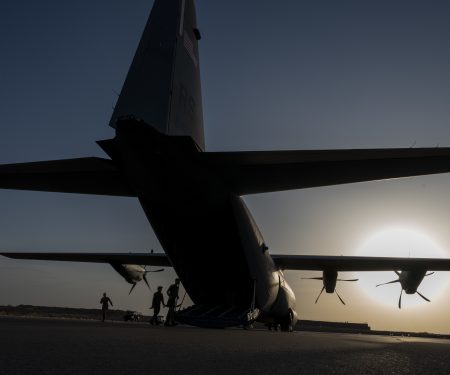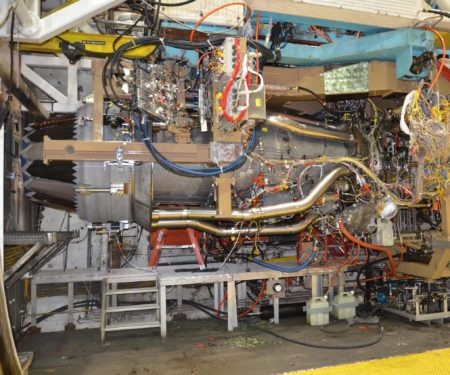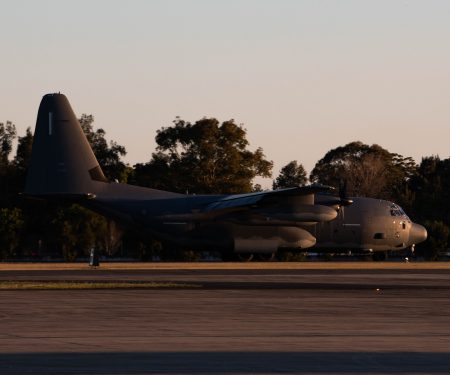Radar Sweep
US Orders Pull-Out of Many US Embassy Personnel in Niger
The U.S. government is ordering many U.S. embassy personnel to temporarily leave Niger amid the country’s military coup. The State Department announced Aug. 2 that it was ordering “non-emergency U.S. government personnel” and their families to leave Niger. A core group of staffers will remain, and the facility will not close. But the embassy has “suspended routine services, and is only able to provide emergency assistance to U.S. citizens in Niger.” Such orders typically apply primarily to American citizens and it was not immediately clear if it would apply to non-U.S. citizens employed by the embassy.
Air Force Tackling Network Needs for Future CCA Drone Operations
The Air Force is working closely alongside the Navy to determine what networking components, both hardware and software, are needed to operationalize future “collaborative combat aircraft” that can be leveraged by both services. The CCA drones are expected to fly alongside the Air Force’s manned aircraft, including the forthcoming Next-Generation Air Dominance fighter jet and other manned platforms. The service is planning for a fleet of 1,000 modular drones, with a goal to begin fielding them by the end of the decade.
Advancing the Warfighter
The way modern Airmen and Guardians prepare for the future fight is changing, with live, virtual, and constructive training offering new ways to practice essential skills. Learn more about how virtual and augmented reality, simulated environments, and other technologies are helping train warfighters everywhere from the cockpit to the maintenance depot.
US Air Force Electronic Warfare Commander Seeks Spectrum Dominance
Bombs boom. Tanks trundle. Fighters fly. All are visible to the human eye and are familiar images of war. But invisible battles are fought, too. And as the U.S. prepares for potential conflict with China in the Indo-Pacific or with Russia in Europe, the value of the electromagnetic spectrum is proving paramount. Militaries rely on the unseen energy to communicate, guide weapons, spoof and spy, and more.
Startup iRocket Signs Agreement to Develop and Test Hardware at US Air Force Facility
Innovative Rocket Technologies, known as iRocket, has signed an agreement with the Air Force Research Laboratory to jointly develop and test rocket propulsion hardware. The New York-based startup, founded in 2018, develops rocket engines and plans to build a small launch vehicle. iRocket signed a four-year cooperative research and development agreement, or CRADA, with AFRL’s Rocket Propulsion Division, the company said Aug. 2.
How Lockheed Is Positioning the F-22 to Fly Into the 2040s
Lockheed Martin officials say they can support the F-22 as long as the Air Force wants to fly it, even if that’s a decade longer than currently planned. “There's no limitation on the airplane itself that drives it. That will be a decision in terms of force management and how soon any replacements or other technologies might come along, so we're posturing beyond seven years,” OJ Sanchez, vice president of Lockheed’s F-16 and F-22 programs, told Defense One. “We're continuing to think, ‘How do we keep the airplane relevant?’”
Israel Says US Has Given Green Light to Send David’s Sling to Finland
The U.S. approved the sale of David’s Sling, the air defense system jointly developed by Israel and the US, to Finland, according to the Israeli military, clearing likely the last diplomatic hurdle for the $345 million deal. “The approval granted by the U.S. government today for the sale of the David’s Sling […] marks a significant step towards the realization of a historic agreement between Israel and Finland,” Israel Defense Minister Yoav Gallant said in a statement. He called the news a “new milestone in the cooperation between our countries that will improve our response to global and regional threats.”
Husband Passes Guidon to His Wife During Rare Air Force Change-of-Command Ceremony
When the 51st Operations Group at this U.S. air base south of Seoul changed commanders recently, few failed to notice the incoming and outgoing colonels shared the same last name. Col. Kathryn Gaetke took over on June 14 from her husband, Col. Matthew Gaetke, who moved over to lead the 607th Air Operations Center at Osan.
Inside an Air Force Pararescue Mission in the Middle of the Pacific Ocean
The text arrived on Tech Sgt. Kyle Olson’s phone late on a Friday afternoon. “26 YOM head injury, struck in head by metal pole,” the text read. “Blood loss, in/out of consciousness. 2000 nm away,” the shorthand for ‘nautical miles.’ “130s are determining if they can make it in a day.” Olson understood immediately: somewhere in the middle of the Pacific Ocean, a 26-year-old sailor was in critical condition and the 129th Rescue Wing was going to go get him.
F-35B Just Touched Down on the Old Pacific Coast Highway
The Marines just landed an F-35B Joint Strike Fighter on an old 50-foot-wide highway in Southern California, refueled and rearmed, and took back off again. At this same improvised forward arming and refueling point, a Marine MV-22 Osprey tilt-rotor passed over a torpedo to a waiting Navy MH-60R Seahawk helicopter. This was a glimpse of what is to come for future Marine operations in the Pacific, and The War Zone was there to watch all of it unfold.
That Time an Air Force Sergeant Spotted Pulsars Months Before Astronomers
Here's a bit of science history that genuinely surprised many of us here at Ars Technica. We all know the famous story of how Jocelyn Bell-Burnell discovered pulsars in 1967 as a graduate student at the University of Cambridge—and the longstanding debate about whether she should have shared the Nobel Prize awarded to her supervisor, Antony Hewish. But apparently, an Air Force staff sergeant manning an early warning radar station in Alaska arguably beat Bell-Burnell to the punch. He just couldn't come forward until 2007, after the instrument had been decommissioned.




